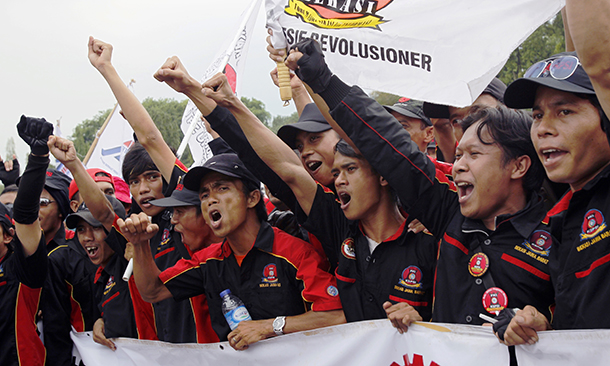JAKARTA, Indonesia—Thousands of Indonesian factory workers took to the streets in the country’s capital Thursday to protest low wages and a new social security law that will require them to pay for health services.
Several thousand laborers rallied peacefully near the presidential palace in Jakarta before marching to the parliament building, said Jakarta police spokesman Col Rikwanto, adding nearly 20,000 police and soldiers watched over the demonstration organized by Indonesian labor unions.
The protesters, dressed in red and black, shouted “Reject the law” as buses and trucks arrived with loads of workers waving colorful flags and banners lambasting a 2011 law requiring workers to contribute a percentage of their pay for social security and health benefits. The law is scheduled to take effect in 2014.
The workers refuse to be burdened by additional premiums to obtain health insurance and social security, which they see as the government’s responsibility as mandated by the constitution, said Yoris Raweyai, chairman of the Confederation of Indonesian Workers’ Union.
“That law is clearly unconstitutional … we want a revision,” he said.
The protesters demanded an increase in the minimum wage and implementation of a government policy to stop companies from hiring temporary workers without benefits. Similar protests have been held recently in other Indonesian cities, calling on the government to improve wages in Southeast Asia’s largest economy.
Factory workers in Indonesia earn an average basic salary of just more than US $120 a month. The economy grew 6.5 percent last year, the fastest pace since the 1997-98 Asian financial crisis. But the cost of living has been increasing, making it harder for workers to pay for food and other basic necessities.
The new governor of Jakarta agreed on Tuesday to increase the minimum wage in the capital by more than 40 percent to $228 from $158, a move that has prompted labor groups across the country to ask for higher pay. Local authorities in Indonesia set minimum wages, so they vary in each region.
Sofyan Wanandi, chairman of the Indonesian Employers’ Association, said frequent worker protests and higher labor costs could frustrate business communities and may lead to massive layoffs.
“That’s bad for the country … not all companies can afford it,” Wanandi said, referring to a boost in the minimum wage.
He said the labor protests and higher labor costs, combined with poor infrastructure, red-tape and corrupt officials, could lead investors to flee to neighboring countries.
















